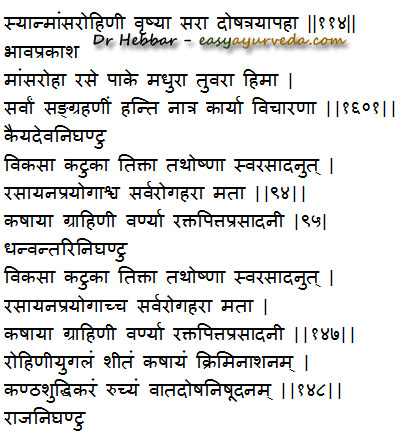Indian Redwood – Mamsarohini Uses, Dose, Research
Indian redwood is identified botanically as Soymida febrifuga. It is indicated in IBS, bleeding disorders, anorexia. It is hailed as Rasayana – anti aging, and is also useful in improving skin complexion.
Mamsarohini
Botanical names- Soymida febrifuga a. Juss, Synonym: Swietenia febrifuga
Family – Meliaceae (Nimba kula)
Table of Contents
Vernacular names
Names in different languages:
Hindi name- रोहन Rohan, रक्तरोहन Raktarohan,
English name- Indian red wood, Bastard cedar
Telugu name- Somida chettu, chevamanu, cheramaanu
Marathi name: guhin-ruhina, potar, ruhin
Kannada name – kalgarige, kalkarige, kemmara
Oriya name – suam
Tamil name – chataputpilinapam, chataputpinai
Urdu: रोहन Rohan
Sanskrit synonyms
Atiruha, Vrunta, Charmakari, Krusha, Praharavalli, Vikasha, Vikasa, Veeravalli, Mamsaroha, Lata, Pishitarohini, Vrutta,
Chemical composition
Soymida febrifuga chemical composition:
Lupeol, Sitasterol, Deoxyandirobin
Febrifugin, Methyl angolensate, Febrinins A& B epoxyfebrinin B, Febrinoide
Methyl angolensate, luteolin 7-O-glucoside, quercetin, sitosterol, myrecetin
Classical categorization
Mams Rohini – Classical categorization
Charaka- Balya – group of herbs that improves strength and immunity
Sushruta- Nyagrodhadi gana
Vagbhata- Balya, Nyagrodhadi gana
Bhavaprakasha – Guduchyadi Varga
Kaiyadeva Nighantu – Oshadhi Varga
Dhanvantari Nighantu – Karaveeradi Varga
Raja Nighantu – Chandanadi Varga
Medicinal properties
Mamsarohini medicinal Properties:
Rasa (taste) – Katu (pungent), Kashaya – astringent, Madhura – sweet
Guna (qualities) – Laghu – light to digest, Rooksha – Dryness
Vipaka- Katu – Undergoes pungent taste conversion after digestion
Veerya – Sheeta – Coolant
Effect on Tridosha – Balances all the three Doshas.
Prabhava – Special effect – Vrushya – aphrodisiac, improves vigor
Part used, dosage
part used- Stem bark, heart wood
Dosage- 1-3 g of powder, decoction 25-50 ml
Sanskrit verse

Uses, indications
Indian redwood uses:
Vrushya – aphrodisiac, improves vigor
Sara – induces mobility, causes diarrhea, purgation, relieves constipation
Rasayana – anti aging, causes cell and tissue rejuvenation
Varnya – Improves skin tone and complexion
Kanthashuddhikara – clears throat of mucus secretions
Ruchya – improves taste, relieves anorexia.
Indicated in-
Sangrahani – IBS, sprue, altering diarrhea and constipation
Swarsada – voice disorders
Raktapitta –Bleeding disorders such as nasal bleeding, heavy periods, etc
Krimi – worm infestation
The bark extracts are used in the treatment of rheumatoid arthritis, peptic ulcers.
Having astringent qualities, it is used for vaginal douche to treat vaginal infections.
Its oral administration is indicated in treating leucorrhoea, menorrhagia and dysmenorrhea.
Interaction with medicines, supplements
Can this be used while taking Homeopathic medicine?
Yes. This product does not react with homeopathic medicine.
Can this medicine be continued while taking supplements like multivitamin tablets, Omega 3 fatty acids etc?
Yes. Generally, this product goes well with most dietary supplements. However, if you are taking more than one product per day, please consult your doctor for an opinion.
With western
medicines
Seek your
doctor’s advice if you are taking this product along with other western
(allopathic / modern) medicines. Some Ayurvedic herbs can interact with modern
medicine.
If both Ayurvedic and allopathic medicines are advised together, then it is
best to take Allopathic medicine first, wait for 30 minutes and then take the
Ayurvedic medicine.
Research
Anti microbial activity – Antimicrobial activity was tested against six bacterial and five fungal strains using the agar hole diffusion method and the minimum inhibitory concentrations (MIC) and minimum microbicidal concentration (MMC) were determined for all the test organisms against the extracts. The results showed that the methanol and aqueous extracts of leaf had a higher antioxidant activity and total phenolic content than the hexane extract. The antioxidant activity and TPC of the extracts were highly correlated. Extracts also showed several degrees of antimicrobial activity against different microbes.
Sthanika karma (Action on different system)
External use – Paste is used to apply on wounds to relieve edema and inflammation. Decoction is used for wound cleaning as well as for gargling in mouth and dental diseases. It is also used for Uttaravasti in Pradara (Menorrhagia). Fruit is indicated to impart normal colour after wound healing.
Digestive system – Absorbent, indicated in Diarrhea and Dysentery
Circulatory System – Styptic, Indicated in bleeding disorders
Tapakrama – Antipyretic (Vishamajvarahara / indicated in Malaria))
Satmikarana –Promote fracture healing (Indicated in Asthibhagna, Mamsakshaya, Urakshata)









